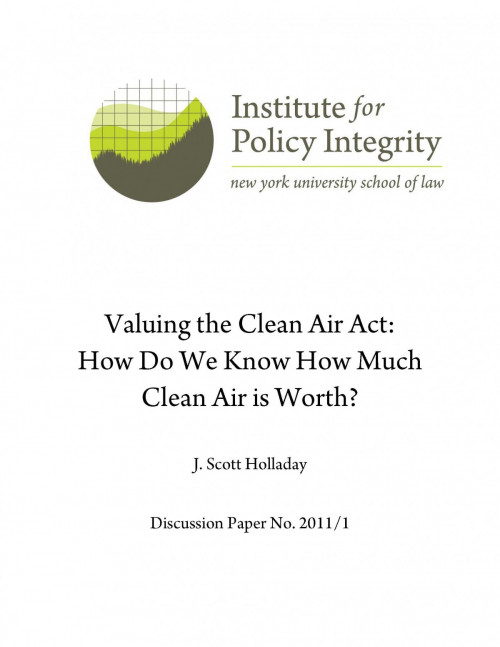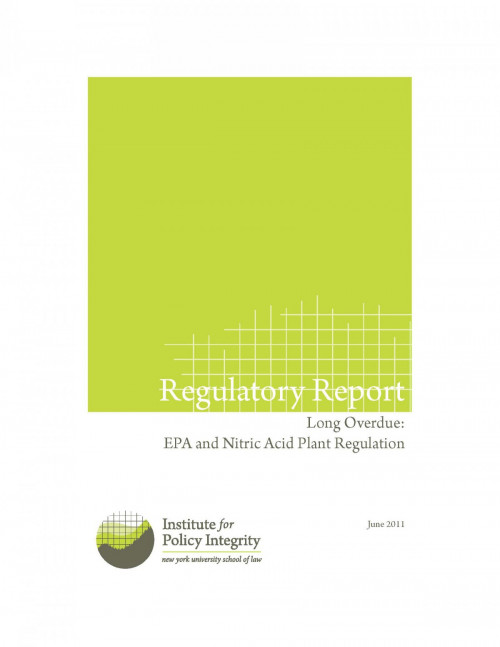-
_200_175_90.jpg)
Prevailing Academic View on Compliance Flexibility under Section 111 of the Clean Air Act
EPA will soon propose performance standards under Section 111 of the Clean Air Act for greenhouse gas pollution. Many argue that to be effective and efficient, the standards should incorporate compliance flexibility. This repport finds widespread agreement in the academic community that § 111 authorizes the use of many types of flexible approaches.
-

Valuing the Clean Air Act
How Do We Know How Much Clean Air is Worth?
EPA recently released a study evaluating the costs and benefits of amendments to the Clean Air Act between 1990 and 2020 to see what cleaner air means for human health and the economy. Holladay’s analysis of EPA’s numbers shows that they’re based on sound science.
-
Letter to HHS on Proposed Transparency Reporting Rule
Policy Integrity submitted a letter today to the Department of Health and Human Services on its upcoming Transparency Reporting rule, mandated by the Affordable Care Act of 2010. The rule would develop uniform disclosure standards for group health plans and health insurance issuers, requiring them to provide consumers with new, more detailed information on likely co-pays for particular plans or treatments; providers would also have to provide consumers with a document that summarizes benefits and explains coverage clearly in four pages or less.
-
Comments on Preliminary Plans for Periodic Retrospective Reviews of Existing Regulations
In January, President Obama issued a call for all federal agencies to review their existing regulations, looking for rules that had grown outdated, ineffective, or insufficient over time. Back then, there was much discussion over whether the move was a gift to business or a robust defense of strong protections even in a downturned economy.
-
Dr. Adam Finkel Gives Congresional Testimony on Regulations
Policy Integrity advisor Dr. Adam Finkel recently answered questions from Rep. Renee Ellmers (R-NC) on regulations and their effect on jobs and businesses as part of testimony given during a House Committee on Small Business hearing.
-

Long Overdue: EPA and Nitric Acid Plant Regulation
Nitric acid plants emit dangerous air pollutants that cause illness and alter the climate. This report finds EPA long overdue on a regulatory revision and at risk of allowing major costs to be imposed on the American public.
-
Letter to HUD on Proposed Homeownership Education Counseling Standards
Policy Integrity submitted a letter today to the Department of Housing and Urban Development (HUD) on its proposal to adopt the National Industry Standards for Homeownership Education Counseling as mandatory, industry-wide requirements. The new regulations would primarily function as a government-certified labeling program, comparable in some respects to the USDA’s National Organic Program or EPA’s Energy Star program. The standards represent a significant effort on part of the homeownership counseling industry to ensure quality and consistency nationwide and, by using them as a template, HUD has a head start on crafting regulations that could provide significant benefits to individuals and families looking to navigate the complex process of buying and financing a home.
-
Dr. Adam Finkel Gives Congressional Testimony on Regulation and Jobs
Policy Integrity advisor Dr. Adam Finkel recently answered questions from Rep. Renee Ellmers (R-NC) on regulations and their effect on jobs and businesses as part of testimony given during a House Commitee on Small Business hearing.
-
Obama Administration’s Retrospective Review Plan
Yesterday, the Obama Administration announced the plans from thirty agencies to conduct retrospective review of regulations—a step towards following up on a presidential executive order issued in January.
-
Update on Letter-Grade Fuel Efficiency Labels
Today, the EPA and DOT announced new fuel-efficiency labels for cars. The new stickers will give shoppers detail on the environmental elements of vehicles—miles per gallon, greenhouse gas ratings and smog emissions.
